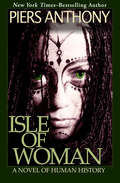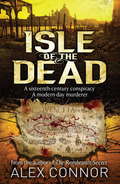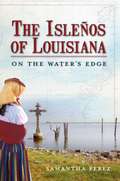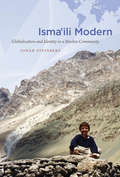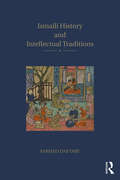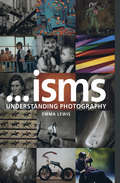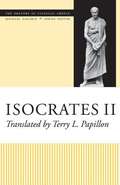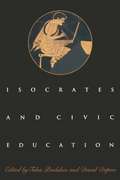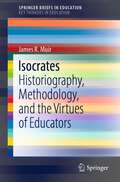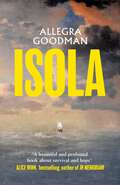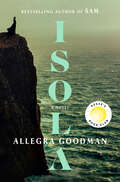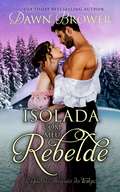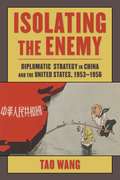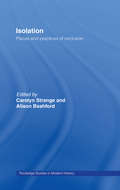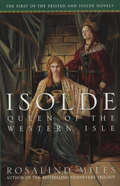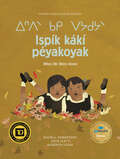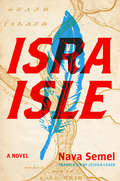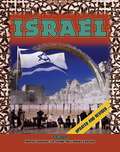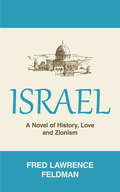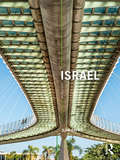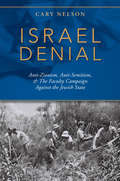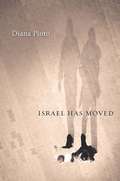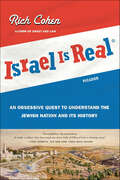- Table View
- List View
Isle of Woman (Geodyssey #1)
by Piers AnthonyFrom the New York Times–bestselling author of the Xanth novels: An epic drama of two souls whose tragedies and triumphs span human history. Piers Anthony&’s Isle of Woman is a monumental epic of unprecedented drama and scope, retelling the saga of humankind in a unique and dramatic way. The culmination of more than a quarter century of research, it is a stunningly ambitious achievement from a master of imaginative fiction. At once grand in scope and intimate in human detail, Isle of Woman tells the story of a man and a woman born at the dawn of human history, separated by fate, yet united by an unquenchable passion that even time could not conquer: Blaze, the fire worker who raised his kind of savagery, and Ember, the beautiful green-eyed woman who forever haunted his dreams. Through their eyes and those of their descendents, we witness humanity&’s odyssey from savagery to civilization as they are reborn again and again throughout history. We share with these two eternal lovers an unforgettable odyssey of triumph, tragedy, and discovery that takes them from the African savannah to the ancient Middle East, from the South Pacific to the caves of northern Europe, from the court of imperial China to India during the British Raj, ending in a stunning reunion in an America in ruins only a few short years from now.
Isle of the Dead
by Alex ConnorVENICE, ITALY: CITY OF SPLENDOUR. CITY OF SECRETS. CITY OF THE SKIN HUNTER. In October 1555 the Italian master Titian painted the portrait of Angelico Vespucci - a Venetian merchant whose cruelty words could not capture. When Vespucci was revealed to be the elusive monster who had been flaying young women across the city, he vanished inexplicably, along with the painting. All that remained was a chilling warning: when the portrait emerges, so will the man. Now the lost Titian masterpiece has surfaced in modern-day London, and skinless corpses are amassing across the globe. And it will fall to an unlikely man from the fringes of the art world to unravel half a millennium of myth, mystery and murder.
Isle of the Dead
by Alex ConnorVENICE, ITALY: CITY OF SPLENDOUR. CITY OF SECRETS. CITY OF THE SKIN HUNTER. In October 1555 the Italian master Titian painted the portrait of Angelico Vespucci - a Venetian merchant whose cruelty words could not capture. When Vespucci was revealed to be the elusive monster who had been flaying young women across the city, he vanished inexplicably, along with the painting. All that remained was a chilling warning: when the portrait emerges, so will the man. Now the lost Titian masterpiece has surfaced in modern-day London, and skinless corpses are amassing across the globe. And it will fall to an unlikely man from the fringes of the art world to unravel half a millennium of myth, mystery and murder.
Islenos of Louisiana, The: On the Water's Edge (American Heritage)
by Samantha PerezLouisiana is perhaps best known for its distinctive French heritage, a legacy visible in the street names and architecture around the state. But in the late 1700s, Louisiana fell under Spanish control. Coaxed by promises of new opportunity, thousands of Canary Islanders of Spanish descent relocated to Louisiana, where they established four settlements. Generations of Islenos have overcome the challenges of an evolving American society, as well as the devastation of storms that have ripped through their land. Through it all, the Islenos have preserved their unique heritage, traditions and culture for more than two centuries. This is their history.
Isma ili Modern Globalization and Identity in a Muslim Community
by Jonah SteinbergThe Isma’ili Muslims, a major sect of Shi’i Islam, form a community that is intriguing in its deterritorialized social organization. Informed by the richness of Isma'ili history, theories of transnationalism and globalization, and firsthand ethnographic fieldwork in the Himalayan regions of Tajikistan and Pakistan as well as in Europe, Jonah Steinberg investigates Isma’ili Muslims and the development of their remarkable and expansive twenty-first-century global structures. Led by a charismatic European-based hereditary Imam, Prince Karim Aga Khan IV, global Isma’ili organizations make available an astonishing array of services--social, economic, political, and religious--to some three to five million subjects stretching from Afghanistan to England, from Pakistan to Tanzania. Steinberg argues that this intricate and highly integrated network enables a new kind of shared identity and citizenship, one that goes well beyond the sense of community maintained by other diasporic populations. Of note in this process is the rapid assimilation in the postcolonial period of once-isolated societies into the intensively centralized Isma'ili structure. Also remarkable is the Isma’ilis’ self-presentation, contrary to common characterizations of Islam in the mass media, as a Muslim society that is broadly sympathetic to capitalist systems, opposed to fundamentalism, and distinctly modern in orientation. Steinberg’s unique journey into remote mountain regions highlights today's rapidly shifting meanings of citizenship, faith, and identity and reveals their global scale.
Ismaili History and Intellectual Traditions
by Farhad DaftaryThe Ismailis represent an important Shiʿi Muslim community with rich intellectual and literary traditions. The complex history of the Ismailis dates back to the second/eighth century when they separated from other Shiʿi groups under the leadership of their own imams. Soon afterwards, the Ismailis organised a dynamic, revolutionary movement, known as the daʿwa or mission, for uprooting the Sunni regime of the Abbasids and establishing a new Shiʿi caliphate headed by the Ismaili imam. By the end of the third/ninth century, the Ismaili dāʿīs, operating secretly on behalf of the movement, were active in almost every region of the Muslim world, from Central Asia and Persia to Yemen, Egypt and the Maghrib. This book brings together a collection of the best works from Farhad Daftary, one of the foremost authorities in the field. The studies cover a range of specialised topics related to Ismaili history, historiography, institutions, theology, law and philosophy, amongst other intellectual traditions elaborated by the Ismailis. The collation of these invaluable studies into one book will be of great interest to the Ismaili community as well to anyone studying Islam in general, or Shiʿi Islam in particular.
Isms: Understanding Photography
by Emma LewisUnderstanding Photography packs an enormous amount of detail into a handy, attractive guide tracing the evolution of photography through a series of interconnected trends, groups, themes and movements – from the invention of the photographic process to the post-internet age. Organised chronologically, this is a uniquely international, comprehensive guide to photography with concise, readable and jargon-free but scholarly insight into major photographers, movements and themes of the past 170 years. In an age where photography is of more resonance and interest than ever before, Understanding Photography offers an in-depth and clear exposition of photography for the interested general reader or student.
Isocrates II
by Terry L. PapillonThis is the seventh volume in the Oratory of Classical Greece. This series presents all of the surviving speeches from the late fifth and fourth centuries BC in new translations prepared by classical scholars who are at the forefront of the discipline.<P><P> These translations are especially designed for the needs and interests of today's undergraduates, Greekless scholars in other disciplines, and the general public. <P> Classical oratory is an invaluable resource for the study of ancient Greek life and culture. The speeches offer evidence on Greek moral views, social and economic conditions, political and social ideology, law and legal procedure, and other aspects of Athenian culture that have been largely ignored: women and family life, slavery, and religion, to name just a few. The Athenian rhetorician Isocrates (436-338) was one of the leading intellectual figures of the fourth century. This volume contains his orations 4, 5, 6, 8, 12, and 14, as well as all of his letters. These are Isocrates' political works. Three of the discourses--Panathenaicus, On the Peace, and the most famous, Panegyricus--focus on Athens, Isocrates' home. Archidamus is written in the voice of the Spartan prince to his assembly, and Plataicus is in the voice of a citizen of Plataea asking Athens for aid, while in To Philip, Isocrates himself calls on Philip of Macedon to lead a unified Greece against Persia.
Isocrates and Civic Education
by Takis Poulakos David DepewCivic virtue and the type of education that produces publicly minded citizens became a topic of debate in American political discourse of the 1980s, as it once was among the intelligentsia of Classical Athens. Conservatives such as former National Endowment for the Humanities chairman William Bennett and his successor Lynn Cheney held up the Greek philosopher Aristotle as the model of a public-spirited, virtue-centered civic educator. But according to the contributors in this volume, a truer model, both in his own time and for ours, is Isocrates, one of the preeminent intellectual figures in Greece during the fourth century B. C. In this volume, ten leading scholars of Classics, rhetoric, and philosophy offer a pathfinding interdisciplinary study of Isocrates as a civic educator. Their essays are grouped into sections that investigate Isocrates' program in civic education in general (J. Ober, T. Poulakos) and in comparison to the Sophists (J. Poulakos, E. Haskins), Plato (D. Konstan, K. Morgan), Aristotle (D. Depew, E. Garver), and contemporary views about civic education (R. Hariman, M. Leff). The contributors show that Isocrates' rhetorical innovations carved out a deliberative process that attached moral choices to political questions and addressed ethical concerns as they could be realized concretely. His notions of civic education thus created perspectives that, unlike the elitism of Aristotle, could be used to strengthen democracy.
Isocrates: Historiography, Methodology, and the Virtues of Educators (SpringerBriefs in Education)
by James R. MuirIsocrates is one of the most remarkable and influential figures in the history of human thought. The influence of his ideas in the history of historical writing, rhetoric, the visual arts, music, religion and theology, political science, philosophy and, above all, educational philosophy and practice in Europe, Australia, North America, North Africa, and the Middle East are well established and widely known. This book argues careful study of the educational philosophy of Isocrates and its legacy can contribute to an improved understanding of the historiography of educational thought, his distinctive normative methodology in both political and educational philosophy, and his arguments about the primary importance of the virtues of self-knowledge and realistic self-appraisal for educational philosophers and practitioners. At a time when educational philosophy has an increasingly precarious academic existence and educationists are actively seeking new historiographical and methodological approaches to the philosophical study of education, there is much to be gained by recovering and reevaluating the historiography and normative methodology of Isocrates and the role they play in educational discourse and practice today.
Isola
by Allegra GoodmanA young woman and her lover are marooned on an island in a deeply moving novel of love, faith and survival, for readers of Jessie Burton&’s The Miniaturist and Anthony Doerr&’s All The Light We Cannot See &‘This made me cry on an airplane but it was worth it! A luscious, rich and moving novel, a beautiful, careful and profound book about survival and hope.&’ Alice Winn, bestselling author of In Memoriam&‘An extraordinary book that reads like a thriller, written with the care of the most delicate psychological and historical fiction&’ Vogue &‘Best Books of 2025&’ In sixteenth-century France, as the heiress to an aristocratic fortune, Marguerite is destined for a life of privilege. Then she is orphaned, and her enigmatic and volatile guardian squanders her inheritance and insists she accompany him on an expedition to the new French colonies of North America. Isolated and afraid, Marguerite befriends her guardian&’s servant and the two develop an intense attraction. But when their relationship is discovered, they are brutally punished, abandoned on a small island with no hope for rescue. From a childhood dressed in gowns and laced pearls in her hair, Marguerite finds herself at the mercy of nature. As the weather turns, blanketing the island in ice, she discovers a faith she had never before needed… Inspired by the real life of a sixteenth-century heroine, Isola tells the timeless story of a woman fighting for survival. &‘A shocking story, made all the more stunning by the fact that it has its roots in true history&’ Jodi Picoult
Isola: A Novel
by Allegra Goodman&“A shocking story, made all the more stunning by the fact that it has its roots in true history.&”—Jodi Picoult, author of By Any Other Name &“A new generation of survival story . . . an extraordinary book that reads like a thriller, written with the care of the most delicate psychological and historical fiction.&”—Vogue (Best of 2025 Preview) A young woman and her lover are marooned on an island in this &“lushly painted&” (People) historical epic of love, faith, and defiance from the bestselling author of Sam.Heir to a fortune, Marguerite is destined for a life of prosperity and gentility. Then she is orphaned, and her guardian—an enigmatic and volatile man—spends her inheritance and insists she accompany him on an expedition to New France. That journey takes a unexpected turn when Marguerite, accused of betrayal, is brutally punished and abandoned on a small island.Once a child of privilege who dressed in gowns and laced pearls in her hair, Marguerite finds herself at the mercy of nature. As the weather turns, blanketing the island in ice, she discovers a faith she&’d never before needed.Inspired by the real life of a sixteenth-century heroine, Isola is the timeless story of a woman fighting for survival.
Isolada com meu Rebelde
by Dawn BrowerLady Odessa sempre foi apaixonada pelo Conde de Havenwood. Ele é o melhor amigo de seu irmão, e vizinho mais próximo. Estava cansada de ele a evitar, então decide remediar a situação. Não havia dúvida de que a amava, no entanto, não entendia porque ele insistia em negar. Ela sai de Kingsbridge, sua casa, no início de uma tempestade, para confrontá-lo. Gavin Barrington, Conde de Havenwood, nunca havia se declarado a Odessa por uma razão. Sua família era amaldiçoada, e se recusava a fazê-la passar por qualquer desastre que seu nome pudesse trazer. Contudo, quando ficam presos em uma cabine de caça, durante uma tempestade de neve de proporções épicas, tudo muda. Em meio a nevasca, eles têm que encontrar um meio de aceitar seu amor e descobrir como superar o maior medo de Gavin, para que tenham uma vida juntos.
Isolating the Enemy: Diplomatic Strategy in China and the United States, 1953–1956 (Studies of the Weatherhead East Asian Institute, Columbia University)
by Tao WangIn the crucial moment after the Korean War, the United States and the People’s Republic of China circled each other warily. They shifted between confrontation and conciliation, ratcheting up tension yet also embarking on peace initiatives.Tao Wang offers a new account of Sino–American relations in the mid-1950s that situates the two great powers in their international context. He reveals how both the United States and China adopted a policy of attempting to isolate their adversary and explores how Chinese and American leaders perceived and reacted to each other’s strategies. Although the policy of the Eisenhower administration was to contain China, Washington often overestimated Chinese aggressiveness, worrying allies and neutral states. Sensitive to the differences within the Western camp, Chinese leaders sought to convince American allies to persuade the United States to back down. Wang analyzes diplomatic maneuvering over a peace settlement in Indochina, an American defense pact with Taiwan, and the anticolonial Bandung Conference, showing how political pressure pushed American leaders to make concessions. He challenges the portrayal of Communist states as driven by ideology, showing that Chinese leaders adopted a pragmatic policy during these crucial years.Drawing on Chinese, Taiwanese, Russian, Vietnamese, British, and American archival material, including reclassified Chinese Foreign Ministry documents, Isolating the Enemy offers new insight into Chinese diplomacy in the 1950s and U.S. foreign policy under the Eisenhower administration through a nuanced portrayal of Sino–American interactions.
Isolation: Places and Practices of Exclusion (Routledge Studies in Modern History #Vol. 1)
by Alison Bashford Carolyn StrangeThis book examines the coercive and legally sanctioned strategies of exclusion and segregation undertaken over the last two centuries in a wide range of contexts. The political and cultural history of this period raises a number of questions about coercive exclusion. The essays in this collection examine why isolation has been such a persistent strategy in liberal and non-liberal nations, in colonial and post-colonial states and why practices of exclusion proliferated over the modern period, precisely when legal and political concepts of 'freedom' were invented. In addition to offering new perspectives on the continuum of medico-penal sites of isolation from the asylum to the penitentiary, Isolation looks at less well-known sites, from leper villages to refugee camps to Native reserves.
Isolde, Queen of the Western Isle (Tristan and Isolde #1)
by Rosalind MilesIsolde is a gifted healer and a princess. Tristan is an intrepid knight. When Isolde and Tristan fall in love, what unfurls is an epic of politics, faith, betrayal, and fate that will leave them both prey to evil but united by their perilous, abiding devotion.
Ispík kákí péyakoyak/When We Were Alone
by David A. RobertsonA young girl notices things about her grandmother that make her curious. Why does her grandmother have long, braided hair and beautifully coloured clothing? Why does she speak Cree and spend so much time with her family? As she asks questions, her grandmother shares her experiences in a residential school, when all of these things were taken away.When We Were Alone won the 2017 Governor General's Literary Award in the Young People's Literature (Illustrated Books) category, and was nominated for the TD Canadian's Children's Literature Award. This edition includes the text in Swampy Cree syllabics and Roman orthography, as well as the original English.
Ispík kákí péyakoyak/When We Were Alone
by David A. RobertsonA young girl notices things about her grandmother that make her curious. Why does her grandmother have long, braided hair and beautifully coloured clothing? Why does she speak Cree and spend so much time with her family? As she asks questions, her grandmother shares her experiences in a residential school, when all of these things were taken away.When We Were Alone won the 2017 Governor General's Literary Award in the Young People's Literature (Illustrated Books) category, and was nominated for the TD Canadian's Children's Literature Award. This edition includes the text in Swampy Cree syllabics and Roman orthography, as well as the original English.
Isra-Isle: A Novel
by Jessica Cohen Nava SemelThis novel is inspired by a true historical event. Before Theodore Herzl there was Mordecai Manuel Noah, an American journalist, diplomat, playwright, and visionary. In September 1825 he bought Grand Island, downriver from Niagara Falls, from the local Native Americans as a place of refuge for the Jewish people and called it "Ararat." But no Jews came. What if they had followed Noah's call? In Nava Semel's alternate history Jews from throughout the world flee persecution and come to Ararat. Isra Isle becomes the smallest state in the US. Israel does not exist, and there was no Holocaust. In exploring this what-if scenario, Semel stimulates new thinking about memory, Jewish/Israeli identity, attitudes toward minorities, women in top political positions, and the place of cultural heritage.The novel is divided into three parts. Part 1, a detective story, opens in September 2001 when Liam Emanuel, an Israeli descendant of Noah, learns about and inherits this island. He leaves Israel intending to reclaim this "Promised Land" in America. Shortly after he arrives in America Liam disappears. Simon T. Lenox, a Native American police investigator, tries to recover Israel's "missing son." Part 2 flashes back to the time and events surrounding Mordecai Noah's purchase of the island from the local Native Americans. Part 3 poses an alternate history: the rise of a successful modern Jewish city-state, Isra Isle, on the northern New York and Canadian border-a metropolis that looks remarkably like New York City both before and after 9/11-in which the Jewish female governor campaigns to become president of the United States.Nava Semel has published novels, short stories, poetry, plays, children's books, and a number of TV scripts. Her books have been translated and published in many countries. Her book, Becoming Gershona, received the 1990 National Jewish Book Award in the US.
Israel
by Adam M. GarfinkleIn 1948 the world witnessed an extraordinary event: the birth of Israel. After two millennia as a stateless people scattered across the globe and frequently persecuted by the societies in which they lived-most tragically during the Holocaust of World War II-Jews finally had a homeland. And the New Jersey-sized country was in Palestine, the ancestral land of the Jewish people. In the years since 1948, Israel has become the Middle East's most powerful, and most democratic, country. But the foundation and defense of the Jewish state ultimately came at the expense of a state for the Palestinians, another people with ancient ties to Palestine. For decades Israeli and Palestinian blood has stained the land, a string of peace initiatives collapsing amid the seemingly endless cycle of attack and retaliation. Resolving the conflict in a manner that preserves Israel's security remains an elusive goal not just for Israel, but also for the many countries with interests in the strategic Middle East, including the United States. Discusses the geography, history, economy, government, religion, people, foreign relations, and communities of Israel.
Israel
by Fred Lawrence FeldmanEpic in scope, rich in history, ISRAEL is a vivid and searing portrait of historical Palestine and America. This powerful and compelling saga tells the story of two Jewish families caught in the tide of history, with all the drama, passion, love, valor and daring of an enduring dream - the founding of the state of ISRAEL.Danny Horodetzky - He was the son of immigrants, a street-wise kid from New York, willing to turn to a life of crime... but a new nation needed his fiery spirit.Rebecca Horodetzky - Danny's sister had everything - wealth, fame and power. Her world seemed secure... until a handsome and charismatic Zionist came into her life.Herschel Kol - He would never forget - or forgive - the young Arab who had taken his father's life. But the cause he served would demand more than vengeance.Encompassing a vast canvas of interwoven locales, characters and stories, ISRAEL is the monumental tale of the men and women who fought to make the Jewish Homeland a reality.Fred Lawrence Feldman is a published fiction and non-fiction author. He lives in Massachusetts, north of Boston.
Israel (The Contemporary Middle East)
by Ilan PappéIsrael is not the only ‘new’ state around, but it is one of the few states whose legitimacy is still questioned, and its future affects the future of the Middle East as a whole and probably the stability of the international system. The reasons for this unique reality lie in its past and the particular historical circumstances of its birth. This book seeks to update analysis of the political history, contemporary politics, economics and foreign policy of this unique state. The first part of the book provides a general history of Israel since its inception until 2000. This general history evolves around the political development of the state, beginning with its origins in the early Zionist history (1882–1948) and ending with the turn of the century. The second part focuses on three contemporary aspects of present-day Israel: its political economy, its culture and its international relations. An epilogue describes Israel’s complex international image today and its impact on the state and its future. Providing a solid infrastructure from which readers can form their own opinions, this book offers a fresh perspective on developments both on the ground and in recent scholarship, and is essential reading for students, journalists and policy makers with an interest in Middle Eastern History, Jewish Studies and Israel Studies.
Israel Denial: Anti-Zionism, Anti-Semitism, & The Faculty Campaign Against the Jewish State
by Cary NelsonA work of “rigorous intellectual inquiry” critiquing the BDS movement in academia (Jewish Journal). Israel Denial is the first book to offer detailed analyses of the work faculty members have published—individually and collectively—in support of the Boycott, Divestment, and Sanctions (BDS) movement; it contrasts their claims with options for promoting peace. The faculty discussed here have devoted a significant part of their professional lives to delegitimizing the Jewish state. While there are beliefs they hold in common—including the conviction that there is nothing good to say about Israel—they also develop distinctive arguments designed to recruit converts to their cause in novel ways. They do so both as writers and as teachers; Israel Denial is the first to give substantial attention to anti-Zionist pedagogy. No effort to understand the BDS movement’s impact on the academy and public policy can be complete without the kind of understanding this book offers.A co-publication of the Academic Engagement Network
Israel Has Moved
by Diana PintoBorn in Europe’s shadow, haunted by the Holocaust, and inspired by the Enlightenment, Israel has changed. Where is this diverse and self-absorbed country heading today? How do its citizens see themselves, globally and historically? Israel Has Moved is a profound and sometimes unsettling account of a country that is no longer where we might think.
Israel Is Real: An Obsessive Quest to Understand the Jewish Nation and Its History
by Rich CohenA NEW YORK TIMES BOOK REVIEW EDITORS' CHOICEA SAN FRANCISCO CHRONICLE BESTSELLERIn AD 70, when the Second Temple was destroyed, a handful of visionaries saved Judaism by reinventing it, taking what had been a national religion and turning it into an idea. Whenever a Jew studied—wherever he was—he would be in the holy city, and his faith preserved. But in our own time, Zionists have turned the book back into a temple, and unlike an idea, a temple can be destroyed. With exuberance, humor, and real scholarship, Rich Cohen's Israel is Real offers "a serious attempt by a gifted storyteller to enliven and elucidate Jewish religious, cultural, and political history . . . A powerful narrative" (Los Angeles Times).
